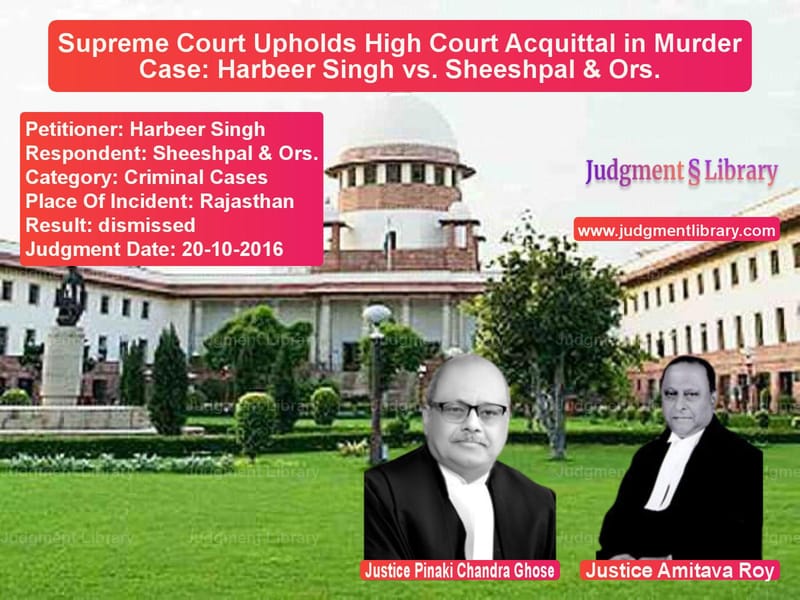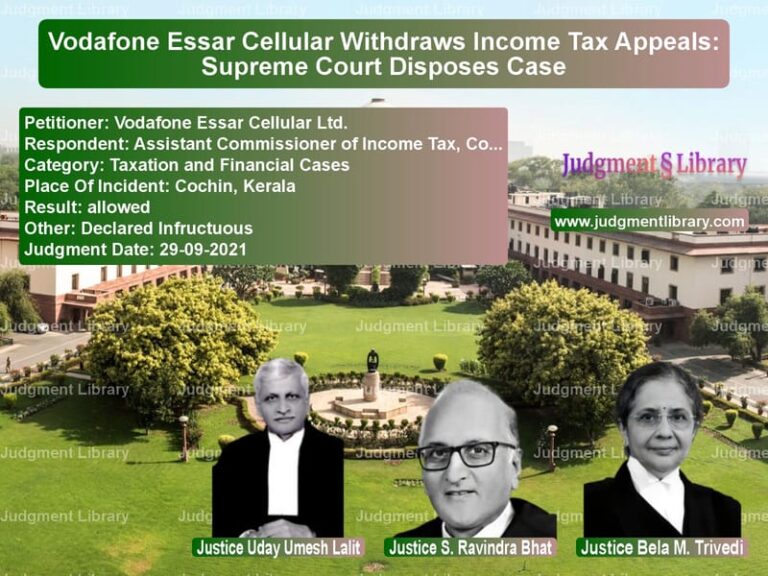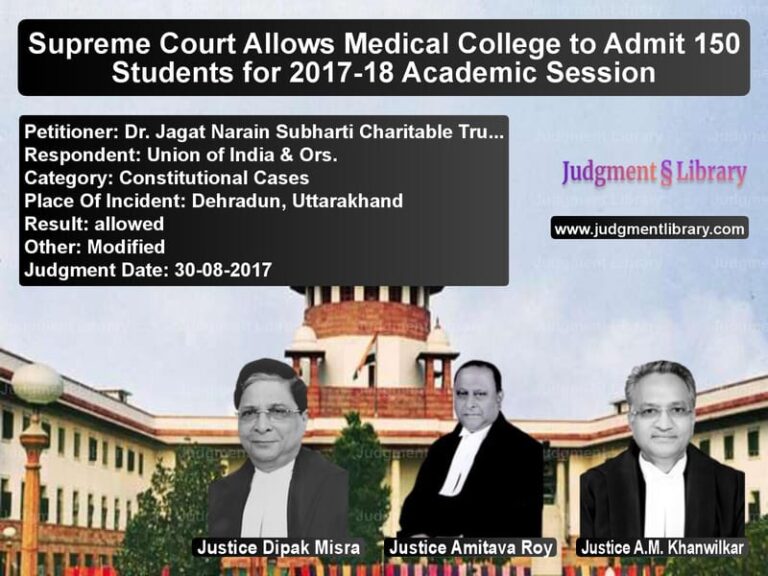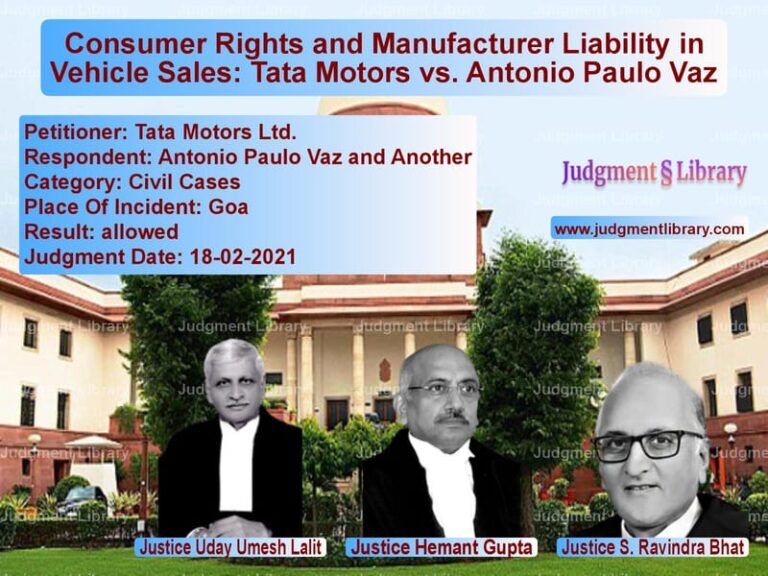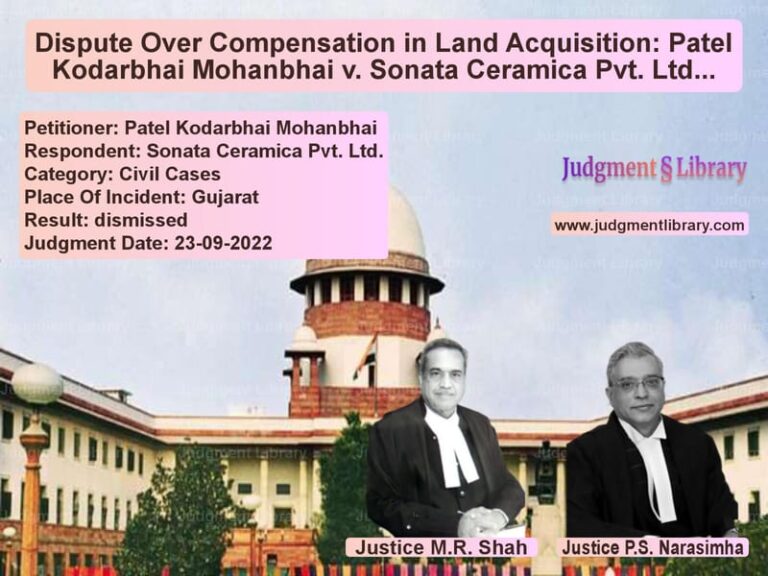Supreme Court Upholds High Court Acquittal in Murder Case: Harbeer Singh vs. Sheeshpal & Ors.
The Supreme Court of India recently ruled on the case of Harbeer Singh vs. Sheeshpal & Ors., concerning the murder of Balbir Singh in Rajasthan. The case, which involved allegations of conspiracy and murder by running over the victim with a jeep, had seen a trial court conviction overturned by the Rajasthan High Court. The Supreme Court upheld the High Court’s acquittal, citing inconsistencies in prosecution evidence and unreliable witness testimonies.
Background of the Case
On December 21, 1993, Balbir Singh was returning home when he was allegedly attacked by the accused. The prosecution claimed that Sheeshpal, the primary accused, drove a jeep over Balbir Singh, dragging him for a distance, causing fatal injuries. The act was reportedly carried out with the assistance of several accomplices, including Bhanwarlal, Nemichand, Shiv Bhagwan, Rajendra, and Prakash.
The case was reported to the Kotwali Sikar Police Station, where an FIR was registered under Section 302 (Murder) of the Indian Penal Code. The police investigation led to the seizure of the vehicle, collection of evidence, and the arrest of the accused.
Trial Court’s Verdict
The Sessions Court convicted the accused under Sections 302, 120B (Criminal Conspiracy), and 149 (Unlawful Assembly) of the IPC. The accused were sentenced to life imprisonment. The trial court relied on eyewitness testimony and forensic evidence linking the accused to the crime.
High Court Overturns Conviction
The accused appealed to the Rajasthan High Court, which reviewed the case and overturned the conviction, acquitting all accused on November 25, 2011. The High Court found:
- The prosecution’s witnesses were unreliable and had made contradictory statements.
- The delay in recording key witness statements raised doubts about the prosecution’s case.
- The forensic evidence was not conclusive enough to establish guilt beyond reasonable doubt.
- The prosecution failed to establish a clear conspiracy linking all accused to the murder.
Appeal in the Supreme Court
Unhappy with the acquittal, Harbeer Singh, son of the deceased, along with the State of Rajasthan, filed a special leave petition before the Supreme Court challenging the High Court’s decision.
Arguments by the Appellants
- The High Court failed to appreciate crucial evidence proving the accused’s involvement.
- The delay in recording witness statements was justified, considering the fear and trauma of the witnesses.
- The trial court had correctly assessed the credibility of witnesses.
Arguments by the Respondents
- The prosecution’s case was weak, with unreliable and contradictory testimonies.
- The forensic evidence did not directly link the accused to the crime.
- The delay in witness statements cast doubt on their credibility.
Supreme Court’s Judgment
The Supreme Court dismissed the appeal, affirming the High Court’s ruling. The Court held:
1. Witness Testimony Was Unreliable
The Supreme Court noted significant contradictions in witness statements and delays in recording them, leading to doubts about their reliability.
2. No Conclusive Forensic Evidence
While forensic evidence was presented, it was insufficient to establish guilt beyond reasonable doubt.
3. High Court’s Acquittal Was Reasonable
The Supreme Court held that in criminal cases, if two views are possible—one favoring the accused—the court should opt for acquittal unless guilt is proven beyond a reasonable doubt.
Key Takeaways
- Importance of Reliable Witness Testimony: Inconsistencies in statements can weaken a prosecution’s case.
- Role of Forensic Evidence: A conviction requires clear forensic links between the accused and the crime.
- Presumption of Innocence: If two interpretations of evidence are possible, courts should lean toward acquittal.
Conclusion
The Supreme Court’s ruling in Harbeer Singh vs. Sheeshpal & Ors. reinforces the principle that criminal convictions must be based on strong, reliable evidence. By upholding the High Court’s acquittal, the Court ensured that doubts in prosecution evidence benefited the accused, as required by criminal jurisprudence.
Don’t miss out on the full details! Download the complete judgment in PDF format below and gain valuable insights instantly!
Download Judgment: Harbeer Singh vs Sheeshpal & Ors. Supreme Court of India Judgment Dated 20-10-2016.pdf
Direct Downlaod Judgment: Direct downlaod this Judgment
See all petitions in Murder Cases
See all petitions in Bail and Anticipatory Bail
See all petitions in Attempt to Murder Cases
See all petitions in Judgment by Pinaki Chandra Ghose
See all petitions in Judgment by Amitava Roy
See all petitions in dismissed
See all petitions in supreme court of India judgments October 2016
See all petitions in 2016 judgments
See all posts in Criminal Cases Category
See all allowed petitions in Criminal Cases Category
See all Dismissed petitions in Criminal Cases Category
See all partially allowed petitions in Criminal Cases Category

